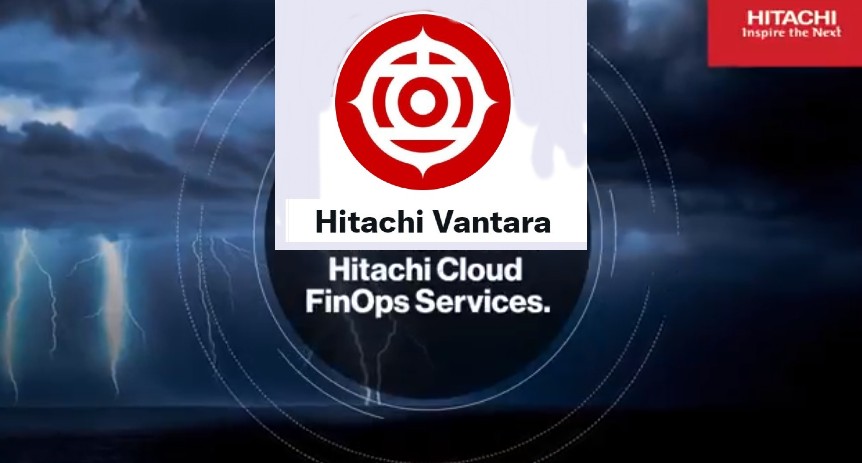Expanding its service portfolio, Hitachi Vantara, the digital infrastructure, data management and analytics, and digital solutions subsidiary of Hitachi, introduced Hitachi Cloud FinOps Services.
This new offering provides a portfolio of services designed to help organisations optimise cloud economics. The end goal: help organisations save money as they deploy their hybrid, multicloud or distributed cloud services – while still maintaining the proper agility and scale to deliver their business and IT results.
Cloud is essential to almost every enterprise in every industry because it accelerates innovation, agility, and growth. However, as companies operating at scale deploy more cloud services, they often find that ungoverned on-demand consumption, and unexpected management and operational costs, are eating up promised cost savings and quickly driving budgets to overrun.
Indeed, IDC predicts increased investment in public cloud cost management through 2022 as enterprises seek to cut cloud waste by 50%[1]. The challenges from inadequate automation, the lack of visibility across cloud accounts, and duplicate and idle resources from poor application architectural design can add up to thousands – or even millions – of dollars in wasted expenditures every year.
New Cloud FinOps Services for Cloud Cost Optimisation and Management
Hitachi Cloud FinOps Services addresses the cloud cost paradox by optimising cloud cost and investments by providing visibility and management across a client’s cloud environments, enabling them to:
Gain control over cloud spend with real-time visibility, right architectural choice and predictable usage.
Get more value from the cloud by balancing cost, speed, and quality.
Future-proof the organisation with best-in-breed cloud services.
Customers, on average receive a 30% saving through our cloud cost optimisation services.
Hitachi Vantara Digital Solutions Business Unit President Roger Lvin said managing cloud costs and investments across multiple cloud environments is complex, and it’s easy to overspend on cloud services with limited visibility and predictability on utilisation.
“Hitachi Cloud FinOps Services addresses this complexity and lowers the total cost of ownership through mapping spend data, tagging, allocating shared costs equitably, and recommending data-driven cost take-out measures,” said Roger Lvin.
Hitachi Vantara’s service portfolio is built on decades of expertise in cloud, application, data, and infrastructure modernisation. The services are delivered through a unique E3 methodology, which is a comprehensive application and data modernisation approach that enables clients to envision, evaluate and execute a FinOps-led program to address the complexity of managing cloud environments. With Hitachi Cloud FinOps Services customers receive a turnkey solution that provides the following outcomes:
Assess the customer’s current cloud cost relative to benchmarks, industry standards and provide a recommendation on where costs can be optimised.
Implement changes that will take out costs from cloud platforms and enable the effective use of real-time cloud cost decision support. Cloud experts map spending data to the business, define budgets and forecasts, set tagging strategy and compliance, build AI-enabled cost anomaly detection, budget alerts for cost visibility, cost recovery and predictability.
Business objectives
For enterprises that need continuous as-a-Service support for managing cloud costs, Hitachi Vantara offers an always-on, managed service to optimise and govern cloud spend against business objectives.
This includes automated enterprise-wide cloud consumption reporting, resource tracking, cost monitoring and continuous cost optimisation through right-sising and usage of correct cloud services. Hitachi Vantara delivers automation and integration for managing cloud cost metrics and supports cloud service lifecycle management through financial analysis and cost management.
Deluxe, a Trusted Payments and Business Technology company, that supports millions of small businesses, thousands of financial institutions, and hundreds of the world’s most valuable brands recently turned to Hitachi Vantara. The company operates at significant scale processing more than $2.8 trillion in annual payment volume.
Commenting on the transformation, Deluxe Chief Information Officer Michael Mathews said Hitachi Vantara’s services have helped to streamline our journey to becoming a nimble technology company.
“In addition to providing ongoing, yearly cost reductions across cloud environments and other savings, they’ve helped us right-size our core infrastructure based on actual consumption, increase our budget capacity for new workloads in cloud, and improve the operational and financial transparency into our technology and cloud operating environments,” said Michael Mathews.
If not managed properly, the cloud cost paradox will cost organisations significantly in wasted expenditures. Hitachi Cloud FinOps Services gives customers the data, insight and expertise to know better, allowing them to do their cloud, their way.
Hitachi Cloud FinOps Services help companies to implement a highly automated converged infrastructure. It helps to migrate and modernised the determined applications on a public cloud, with Managed Cloud Services from Hitachi Vantara, including infrastructure-as-a-service (IaaS) cloud computing, managed backups and patching, modern cloud security and 24/7 monitoring and support. This helps companies balance cost, agility and quality to compete and delivered the following benefits:
Benefits of Hitachi Cloud FinOps Services
Agility and quality.
Integrated IT across acquired companies and added next-generation security.
Migrated and modernised applications for the cloud.
Reduced outsourcing costs significantly, without increasing IT workload.
Cost visibility and cloud cost optimisation.
Improved C-suite visibility into burndown per business unit in real time.
Cut compute costs in half.
Achieved double-digit cost reduction across clouds.
Eliminated wasted spend by rightsising cloud resources based on actual consumption.
Increased budget capacity for new workloads in the cloud.
Cost predictability.
Gained real-time budget monitoring and alerts for budget overruns.
Managed costs to allow for accurate forecasts and budgeting.





